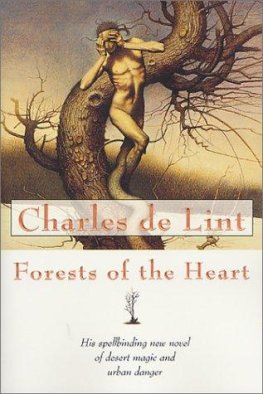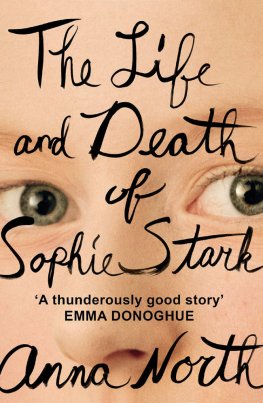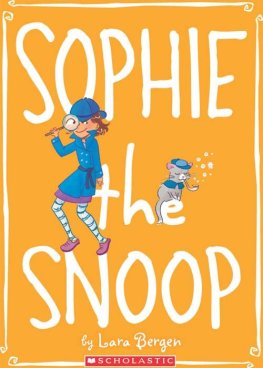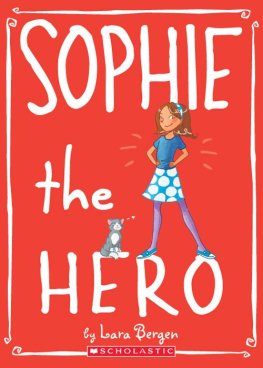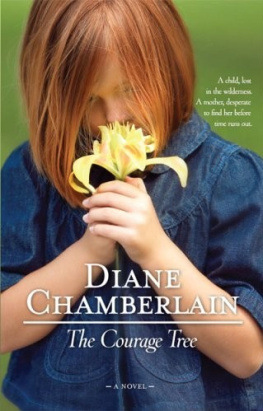for Jane Yolen who showed me how to touch magic and pass it on
FATHER, O FATHER, WHAT DO WE HERE
IN THIS LAND OF UNBELIEF AND FEAR
THE LAND OF DREAMS IS BETTER FAR,
ABOVE THE LIGHT OF THE MORNING STAR.
WILLIAM BLAKE
WE ARE ALL IN THE GUTTER, BUT SOME OF US ARE LOOKING AT THE STARS.
OSCAR WILDE
Grateful acknowledgments
are made to:
Happy Rhodes for the use of the lines from "Words Weren't Made for Cowards" from her album Warpaint. Copyright 1991 by Happy Rhodes; lyrics reprinted by permission. For more information about Rhodes's music, contact Aural Gratification, P.O. Box 86458, Academy Station, Albany, NY 12208.
Kiya Heartwood for the use of a verse of "Wishing Well" from her album True Frontiers. Copyright 1993 by Kiya Heartwood; lyrics reprinted by permission. For more information about Heartwood's music, contact Pame Kingfisher at Roaddog Booking & Management, (800) 382-5895.
Copyright Acknowledgments
"Waifs and Strays" first appeared in Journeys to the Twilight Zone, edited by Carol Serling; DAW Books, 1993. Copyright 1993 by Charles de Lint.
"Mr. Truepenny's Book Emporium and Gallery" was first published by Cheap Street, 1992. Copyright 1992 by Charles de Lint.
"The Forest Is Crying" first appeared in The Earth Strikes Back, edited by Richard Chizmar; Mark Zeising Books, 1994, Copyright 1994 by Charles de Lint.
"The Wishing Well" was first published by Axolotl Press, 1993. Copyright 1993 by Charles de Lint.
"Dead Man's Shoes" first appeared in Touch Wood: Narrow Houses, Volume Two, edited by Peter Crowther, Little, Brown and Company, 1993. Copyright 1993 by Charles de Lint.
"Bird Bones and Wood Ash" is original to this collection.
"A Tempest in Her Eyes" first appeared in Weird Tales from Shakespeare, edited by Katharine Kerr and Martin H. Greenberg; DAW Books, 1994. Copyright 1994 by Charles de Lint.
"Saxophone Joe and the Woman in Black" first appeared in Catfantastic III, edited by Andre Norton and Martin H. Greenberg; DAW Books, 1994. Copyright 1994 by Charles de Lint.
"The Bone Woman" was first published by Triskell Press, 1992. Copyright 1992 by Charles de Lint.
"Pal o' Mine" first appeared in Christmas Forever, edited by David G. Hartwell; Tot Books, 1993. Copyright 1993 by Charles de Lint.
"Where Desert Spirits Crowd the Night" first appeared in Worlds of Fantasy and Horror #2, Fall 1994. Copyright 1994 by Charles de Lint.
"Dream Harder, Dream True" first appeared in Temporary Walls, edited by Greg Ketter and Robert T. Garcia; Dream-Haven Books, 1993. Copyright 1993 by Charles de Lint.
"The Pochade Box" first appeared in Thunder's Shadow, Vol. V, No. 1, 1994. Copyright 1994 by Charles de Lint.
"Coyote Stories" was first published by Triskell Press, 1993. Copyright 1993 by Charles de Lint.
"The Forever Trees" first appeared in Worlds of Fantasy and Horror #2, Fall 1994. Copyright 1994 by Charles de Lint.
As anyone involved knows, contrary to the belief that artists create in the isolation of their workspaces, the act of creation is not a solitary endeavor. Without the inspiration and support I've received over the years, these stories wouldn't exist, so this time out I'd like to thank:
My wife; MaryAnn, for her help in the genesis of many of these stories and in their fine-tuning, always knowing when and where to say the right thing;
My editors at Tor, Terri Windling, Patrick Nielsen Hayden, Donald G. Keller and Greg Cox, for having enough faith in these stories to request a second volume sight unseen, and for making the publishing process so painless;
My agent, Richard Curtis, for finding me the spaces between novels when I could write these stories;
Altan, Tori Amos, Sarah Bauhan, Lisa Germano, Kiya Heartwood, Maria Kalaniemi, Peter Kater, Jon Mark, R. Carlos Nakai, Johnette Napolitano, Happy Rhodes and Ian Tamblyn, whose music keeps me sane;
All those editors who first asked for the stories collected herein: Kurt Busiak, Richard Chizmar, Pete Crowther, Bob Garcia, Marty Greenberg, David Hartwell, Kit Kerr, Greg Ketter, Andre Norton, John and George O' Nale, Kris Rusch, Darrell Schweitzer, Erik Secker, Carol Serling and Dean Smith.
A few notes concerning individual stories:
In "The Bone Woman," the idea of La Huesera comes from the folklore of the American Southwest. My thanks to Clarissa Pinkola Ests for making me aware of the tale.
In "Where Desert Spirits Crowd the Night" the story of Coyote and the Buzzard is based upon traditional Kickapoo folk lore.
"The Wishing Well" was written for MaryAnn, who wanted to know what was in the well, and for Jane Siberry, for her own "strange well" of songs. Special thanks to Dr. Sean Costello (a fine author in his own right) for technical advice.
Charles de Lint
Ottawa, Canada
Do I have to prod;
Reach into your chest
And pull your feelings out?
Happy Rhodes, from "Words Weren't Made for Cowards"
1
There's a big moon glowing in the sky, a swollen circle of silvery-gold light that looks as though it's sitting right an top of the old Clark Building, balancing there on the north-east corner where the twisted remains of a smokestack rises up from the roof like a long, tottery flagpole, colors lowered for the night, or maybe like a tin giant's arm making some kind of semaphore that only other tin giants can understand. I sure don't.
But that doesn't stop me from admiring the silhouette of the smokestack against that fat moon as I walk through the rubble-strewn streets of the Tombs. I feel like a stranger and I think, That moon's a stranger, too. It doesn't seem real; it's more like the painted backdrop from some forties soundstage, except there's no way anybody ever gave paint and plywood this kind of depth. We're both strangers. That moon looks like it might be out of place anywhere, but belonged here once.
Not anymore, though. I'm not even supposed to be here. I've got responsibilities now. I've got duties to fulfill. I should be Getting Things Done like the good little taxpaying citizen I'm tying to be, but instead I'm slumming, standing in front of my old squat, and I couldn't tell you why I've come. No, that's not quite right. I know, I guess; I just can't put it into words.
"You've got to see the full moon in a country sky sometime," Jackie told me the other day when she got back from her girlfriend's cottage. "It just takes over the sky."
I look up at it again and don't feel that this moon's at all diminished by being here. Maybe because in many respects this part of the city's just like a wilderness about as close to the country as you can get in a place that's all concrete and steel. Some people might say you'd get that feeling more in a place like Fitzhenry Park, or on the lakefront where it follows the shoreline beyond the Pier, westward, out past the concession stands and hotels, but I don't think it's quite the same. Places like that are where you can only pretend it's wild; they look right, but they were tamed a long time ago. The Tombs, though, is like a piece of the city gone feral, the wild reclaiming its own not asking, just taking.
In this kind of moonlight, you can feel the wilderness hiding in back of the shadows, lips pulled in an uncurbed, savage grin.
I think about that as I step a little closer to my old squat and it doesn't spook me at all. I find the idea kind of liberating. I look at the building and all I see is a big, dark, tired shape hulking in the moonlight. I like the idea that it's got a secret locked away behind its mundane facade, that's there's more to it than something that's been used up and then just tossed away.


